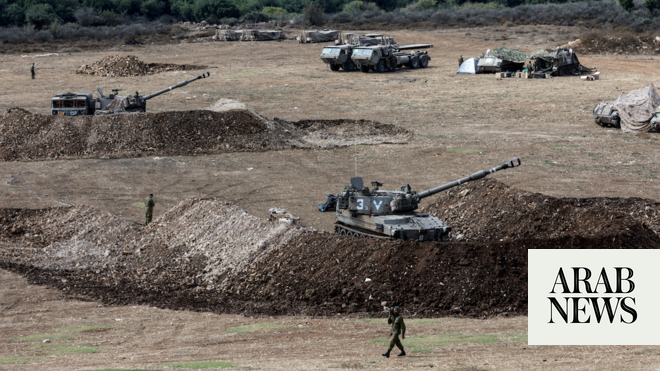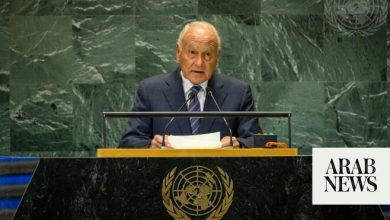Israel on high alert after rocket exchanges at Lebanon border

[ad_1]
BEIRUT: The UN force in Lebanon conducted intensive patrols along the southern border of the country on Tuesday, following hours of rocket exchanges between Israeli forces and Hezbollah fighters.
Correspondents in the southern region reported “Israeli soldiers on high alert on the other side of the border and the deployment of the Lebanese army from the Lebanese side.”
The tensions led to the displacement of more people from the border area toward the cities of Sidon, Beirut and the Bekaa region, amid intense Israeli jet intrusions in Lebanese airspace.
All public and private schools located south of the Litani Line, especially in the districts of Tyre and Bint Jbeil, were closed.
The Lebanese University announced the closure of all its branches in the south, in Nabatieh, Tyre and Bint Jbeil, “due to the tense security situation on the southern border.”
Hezbollah officially mourned the loss of three of its members who were killed in an Israeli airstrike on the outskirts of Marwahin, Boustane, az Zallutiyya, Yarine and Naqoura, and the town of Ayta ash Shab in the Bint Jbeil district.
This came after a group from Hezbollah launched an attack on Monday afternoon on the Israeli Pranit barracks, which serves as the command center of the Galilee Division, and the Avivim barracks, a command center of a battalion affiliated with the Western Brigade, with guided missiles and mortar shells. The party reported “inflicting human losses on the Israeli army.”
Lebanese regions saw a rush of residents to gas stations for the second consecutive day, as well as to shopping centers and warehouses, to stock up on supplies, amid fears that the confrontations on the border would escalate into a battle that spilled over into the Lebanese interior.
In the context of containing any repercussions from the events in the Gaza Strip, Parliament Speaker Nabih Berri held a meeting with caretaker Prime Minister Najib Mikati. Berri also met US Ambassador to Lebanon Dorothy Shea.
Mikati called for a Cabinet session on Thursday “to discuss the security situation in the country and the measures taken,” and held talks with the country’s top military officials.
The British Foreign Ministry, through its embassy in Lebanon, “advised travel to Lebanon only when necessary and not to go to certain areas south of the Litani River, which include the Naqoura-Tyre-Sidon-Beirut Highway and the areas west of it.”
It also warned “against going to the Hermel area, including the cities of Arsal, Ras Baalbek, Qaa, Labweh, and Nahle, and the Palestinian refugee camps, or within five kilometers of the border with Syria.”
British Ambassador Hamish Cowell stressed “the importance of Lebanon not being drawn into the conflict and remaining distant from it.”
A political observer told Arab News: “Lebanon and its economy cannot bear the repercussions of any new war with Israel that breaks out in the south and extends to the rest of the country.
“The tensions on the southern Lebanese border have not yet reached the point of opening a war front with Israel, and their objective seems to be to alleviate pressure on the Gaza front.
“The cost of the war on Lebanon is exorbitant, and it has previously gone through the experience. Lebanon’s infrastructure is run down, and it faces a monetary collapse if it gets involved in the war. Massive chaos with dangerous social repercussions might ensue, especially if Israel strikes vital facilities and ports.”
The Lebanese Kataeb Party warned, after a meeting of its political council, against Lebanon sliding into a new war “that is unnecessary and serves a plan aimed at stabilizing power equations in the region and prioritizing foreign interests over Lebanese interest.”
It added: “The use of Lebanese territory and linking it to the Palestinian arena is unacceptable, and Hezbollah or any of the Palestinian factions cannot speak on behalf of Lebanon, whether in war or peace, because this decision belongs to the Lebanese state and all its institutions.”
The party condemned “Israel resorting to the logic of force and violence that has brought nothing but destruction for 75 years, displacing the Palestinian people and leaving them at the mercy of agreements that have remained ink on paper.”
The Lebanese Press Editors Syndicate on Tuesday condemned “the attack on Al Arabiya reporter Mahmoud Shukr while he was covering the events in southern Lebanon.” He sustained injuries that required hospitalization.
The syndicate also condemned “the targeting of journalists, media personnel, and photographers as they perform their professional duty in covering the events of the Gaza Strip, which has led to the martyrdom of some of them and the destruction of press institutions, news agencies, and Radio Gaza.”
[ad_2]
Source: Arab News




